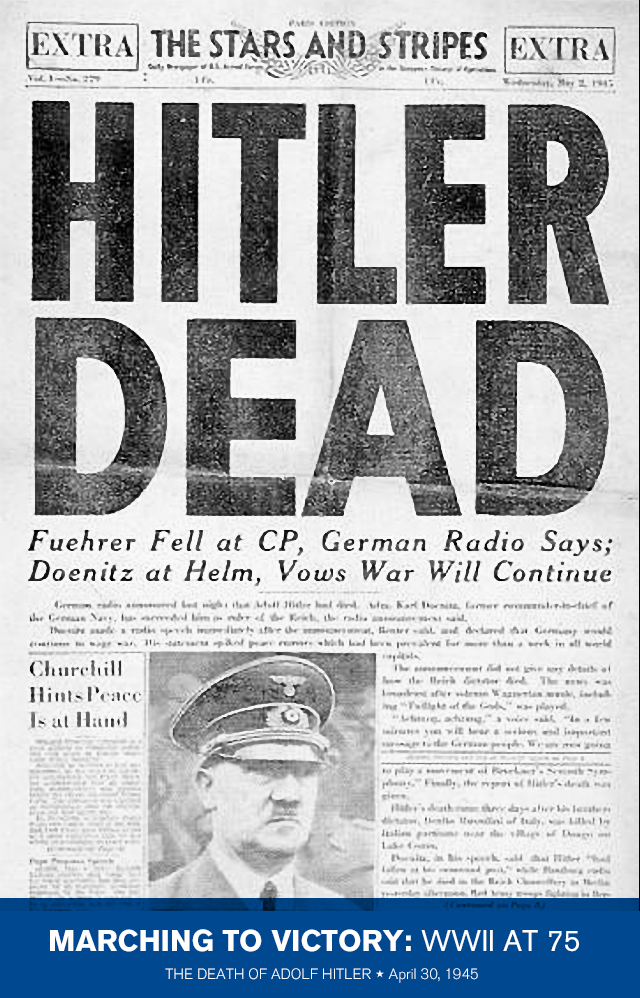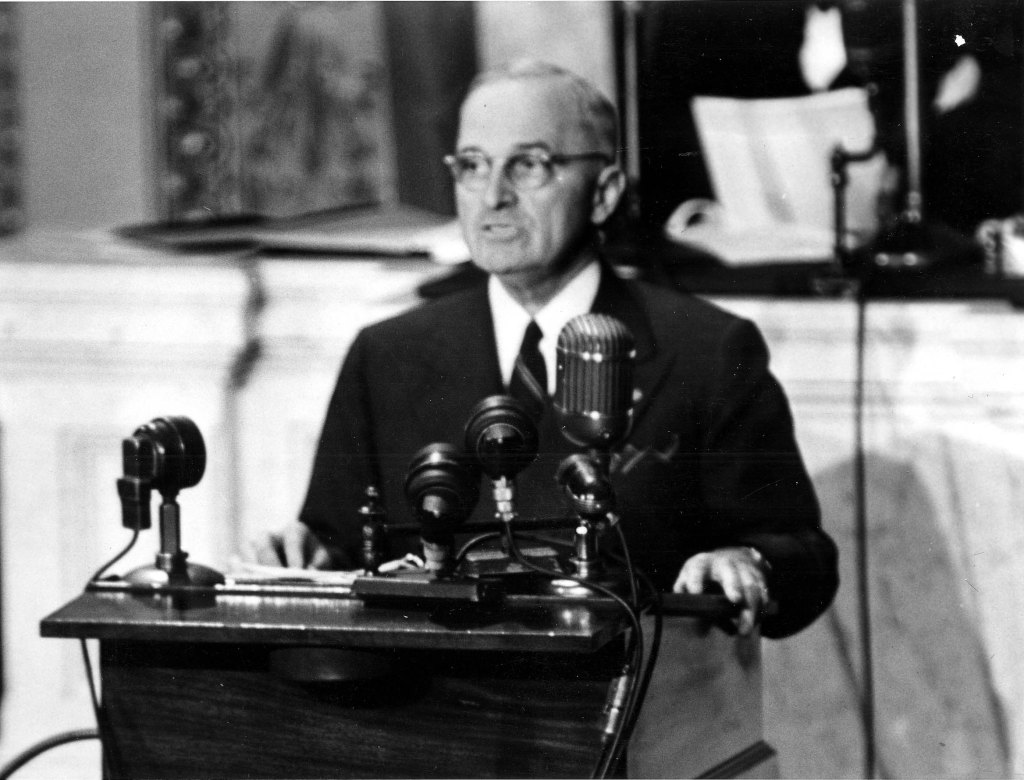WWII 75: Marching to Victory | April 30, 2020

WWII highlights from the Truman Library’s archives and collections
Marching to Victory: The Death of Adolf Hitler
April 30, 1945
75 years ago today – with the Red Army only blocks away – Hitler killed himself in the Führerbunker beneath the city streets of Berlin.
Two days later, on May 2, 1945, Truman met with the press in the White House for what was only his fifth press conference as president.
The press conference started with five relatively mundane announcements: Truman announced and responded to the resignation of Frank C. Walker, the postmaster general; he notified the press that he would nominate Robert E. Hannegan as Walkers’ replacement; he informed the press that he also nominated David E. Lilienthal to be a member of the Board of Directors of the Tennessee Valley Authority; and that the president had issued an executive order appointing Supreme Court Justice Robert H. Jackson as America’s representative on an international military tribunal to try war criminals.
After the announcements, Truman opened the floor to questions.
Eighteen reporters peppered the president with thirty-two questions about wartime negotiations, plans for a V-E Day address, the Polish problem, if the president had lunch with the new ambassador to Argentina, Senator Murray’s bill for full employment, and a number of other topics.
It was not until the twenty-second question that the sixteenth reporter called on finally asked about the death of the Axis leaders.
“Mr. President,” the reporter began, “would you care to comment on the death of Adolf Hitler reported, or Mussolini?”
Truman’s response indicated the looming problem of how to serve justice to Axis leaders who had wrought such havoc on Europe: “Well, of course, the two principal war criminals will not have to come to trial,” Truman said, “and I am very happy they are out of the way.”
“Well, does that mean, sir, that we know officially that Hitler is dead,” the reporter pressed.
“Yes,” Truman succinctly responded.

The transcript of the press conference reveals that when the reporter pressed Truman for official confirmation of the details of Hitler’s death, Truman tread cautiously.
Q. Do we know how he died, Mr. President?
THE PRESIDENT. No, we do not.
Q. Mr. President, I didn’t quite get that. Is it official? This is confirmation that Hitler is dead?
THE PRESIDENT. We have the best–on the best authority possible to obtain at this time that Hitler is dead. But how he died we are not–we are not familiar with the details as yet.
Q. Could you name the authority, Mr. President?
THE PRESIDENT. I would rather not.
Q. Mr. President, do you mean that the–you are convinced that authority you give is the best possible, but it is–but that it is true?
THE PRESIDENT. Yes.
The next reporter called upon changed tactics, trying to get Truman to comment on details about the end of the war he had not yet been able to confirm. News traveled slower in 1945 than it does today. Even then, to paraphrase the ancient Greek playwright Aeschylus, “truth is the first casualty in war.” As Allied armies marched to victory over Nazi Germany in late April of that tumultuous year, Americans on the home front—even President Truman—struggled to keep up with the rush of events. Rumors of major war developments often took several days or weeks to be officially confirmed or denied, and Truman was careful not to spread false or premature information.
Q. Mr. President, do you care to comment at all on the situation in Germany today; that is, would you care to make any extension of your remarks on the surrender of the German army in Italy?
THE PRESIDENT. No, I would not.
Q. Mr. President, do you contemplate a radio broadcast imminently?
THE PRESIDENT. No, I do not.
Q. Mr. President, there have been reports late–later today, following the Italian announcement, that other groups of Germans are on the point of surrendering in the Dutch pockets?
THE PRESIDENT. I hope that is true. I don’t know that it is.
The last reporter called upon tried to get Truman to comment on Mussolini’s execution.
Q. Mr. President, is there anything you can give us in the way of background, regarding last Saturday’s situation and announcement?
THE PRESIDENT. What was that? [Laughter]
Q. I think that was the one
THE PRESIDENT. I can’t give you anything further on it, I am sorry to say.
Reporter: Thank you, Mr. President.
Six days later, Truman would announce to the world that Germany had surrendered. On August 14, 1945, during his eighteenth presidential news conference, Truman would announce that the Japanese would surrender, and the war would soon be over.
For a full transcript of President Truman’s May 2, 1945 press conference, visit TrumanLibrary.org.
75 years ago, World War II ended under President Truman’s decisive leadership. Now, follow key events from the war’s final months with the Truman Library Institute’s series, “Marching to Victory: WWII Highlights from the Truman Library’s Archives and Collections.” The 25-part blog series opens the vaults at Truman’s presidential library to share eyewitness accounts and historic artifacts related to major conflicts and monumental victories – from the Battle of the Bulge to the liberation of Dachau to the unconditional surrender of Japan.
More Marching to Victory
Marching to Victory: The Bombing of Dresden
Marching to Victory: The Yalta Conference
Marching to Victory: The Battle of the Bulge
Marching to Victory: The Tokyo Fire Raids
Marching to Victory: The Battle of Okinawa
Marching to Victory: The Liberation of Buchenwald
Marching to Victory: “The President is Dead”
Marching to Victory: The Liberation of Dachau
Contributed by Will Hickox, Ph.D. He has written for The New York Times and contributed to several digital history projects.
Join our email list to receive Truman updates right in your inbox:



